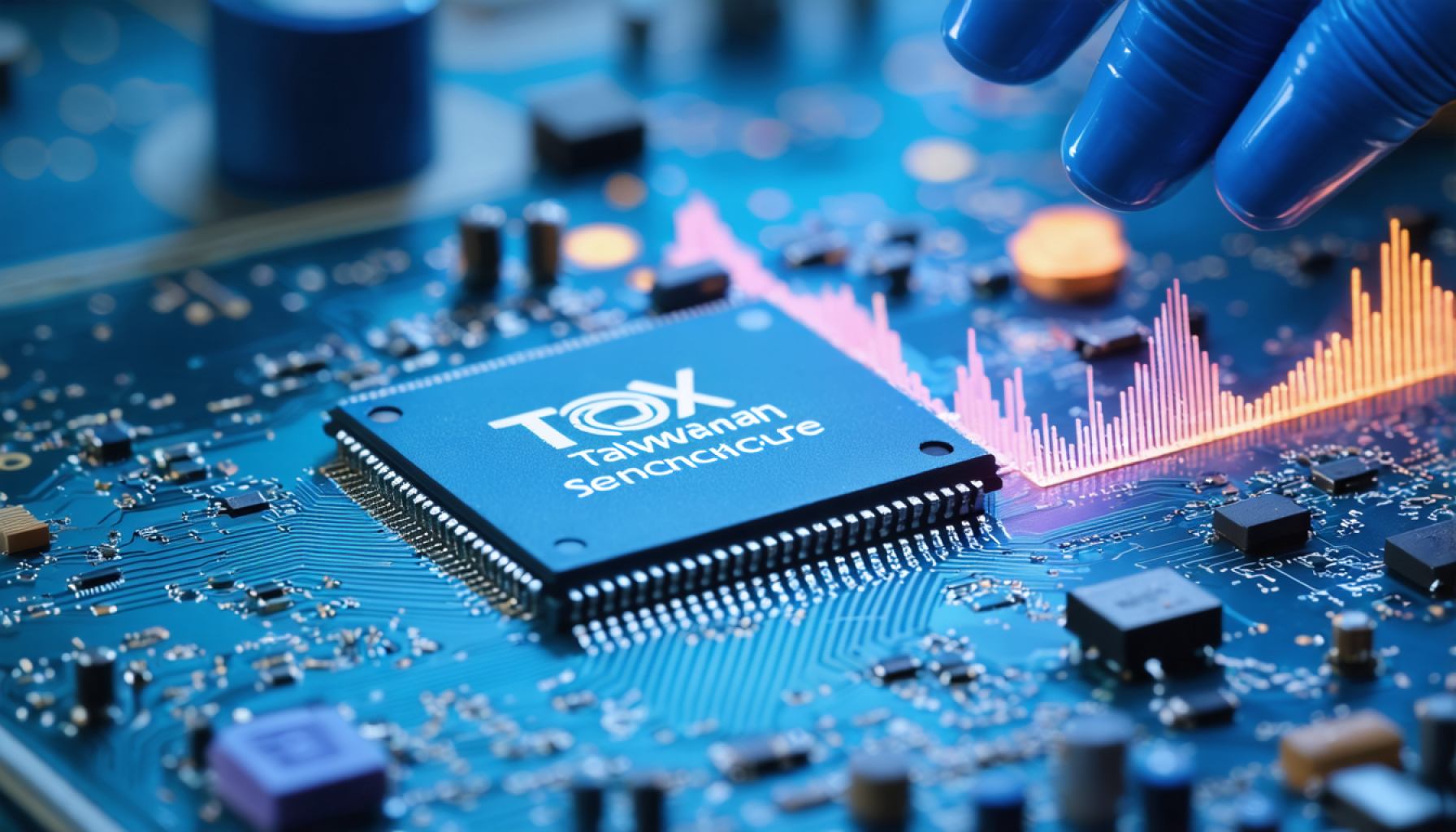- TSMC experienced a notable 6.1% stock drop, reflecting a shift in investor sentiment, while trading volume decreased by 18%.
- Despite recent turbulence, TSMC maintains a strong market cap of $768.01 billion, a P/E ratio of 21.01, and financial stability with a debt-to-equity ratio of 0.24.
- Analysts present mixed views, with some downgrading to “hold” and others, like Barclays, giving an “overweight” rating and higher target price.
- The company increased its quarterly dividend to $0.6855, signaling confidence in ongoing profitability and commitment to investors.
- Institutional investors like FMR LLC and Sanders Capital have adjusted their holdings, reflecting strategic faith in TSMC’s future.
- TSMC remains integral in the semiconductor industry, providing technology essential to the digital age.
- Investors are advised to consider both short-term fluctuations and long-term prospects to navigate the evolving market landscape.
The ordinarily sturdy financial seas at Taiwan Semiconductor Manufacturing Company (TSMC) saw unexpected turbulence recently. A sudden 6.1% drop in their stock might seem alarming, even for this tech titan. Trading at a low of $144.84 before settling at $147.80, these figures mirror an investor mood that’s swaying away from TSMC’s usually resilient allure. The trading volume took a hit, plummeting by 18% from typical levels, hinting at a brewing undercurrent of change.
Yet, like a seasoned mariner facing rough waters, TSMC remains unfazed. With a market cap of $768.01 billion and a solid P/E ratio of 21.01, their foundation seems undeniably robust. Analysts paint a balanced picture; while some recently downgraded the stock to a “hold,” others, such as Barclays, exhibit bullish confidence with an “overweight” rating and an elevated target price.
Peering into TSMC’s ledger reveals a company marked by financial strength—a debt-to-equity ratio of 0.24 underlines this resilience. Its latest earnings beat forecasts, and with a net margin surpassing 40%, TSMC projects an air of reliability amid the sector’s capricious nature.
The firm’s strategic decision to increase its quarterly dividend to $0.6855—up from $0.55—reflects a commitment to rewarding steadfast investors. Such a move can often signal corporate confidence in sustained profitability, easing fears amid the recent market tremors.
Institutional investors continue to maneuver their chess pieces on the investment board. Powerhouses like FMR LLC and Sanders Capital tweaked their holdings, subtly indicating long-term faith in TSMC’s pioneering spirit.
At the heart of TSMC lies a marvel of modern industry. The company crafts semiconductors that fuel the digital age—silicon symphonies performed across global stages from the bustling tech hubs of Silicon Valley to Europe’s innovation corridors.
So, what should the average investor take away from this financial ebb and flow? TSMC’s dip, though noteworthy, could represent a fleeting shadow in its otherwise luminescent journey. Understanding the broader economic choreography is key. For those pondering TSMC’s future horizons, aligning short-term signals with long-term potential is the compass to navigate these digital waters.
As the silicon sea stretches before them, TSMC’s voyage continues, a testament to enduring enterprise amidst the ever-shifting sands of technology and commerce.
Why TSMC’s Recent Stock Dip Could Be a Hidden Opportunity for Investors
Understanding the Current Landscape of TSMC
Taiwan Semiconductor Manufacturing Company (TSMC) has been a formidable force in the global semiconductor industry, known for its innovation and strong financial performance. The recent 6.1% drop in TSMC’s stock may have raised eyebrows, but it offers an insightful case study into market dynamics and potential opportunities for savvy investors.
Real-World Use Cases and Industry Trends
TSMC is integral to the tech world, manufacturing semiconductors for major clients like Apple, NVIDIA, and AMD. Its chips power everything from smartphones and gaming consoles to advanced AI systems and autonomous vehicles. Amid semiconductor shortages, TSMC’s role is more critical than ever, with demand consistently outstripping supply.
Industry experts predict that the semiconductor market will continue to grow. According to Gartner, global semiconductor revenue is expected to exceed $600 billion by 2024, fueled by 5G expansion, AI, and data center demands. This trend positions TSMC well, especially as it invests in advanced technologies like 3nm process nodes expected to be operational soon.
Financial Soundness and Strategic Moves
Despite the stock dip, TSMC’s fundamentals remain strong. A market cap of $768.01 billion and a P/E ratio of 21.01 underscore its financial resilience. The decision to increase its quarterly dividend from $0.55 to $0.6855 further highlights its commitment to shareholders. This move often signals corporate confidence in sustained profitability, offering reassurance to long-term investors.
Institutional and Investor Sentiments
Heavyweights like FMR LLC and Sanders Capital adjusting their holdings may suggest cautious optimism about TSMC’s trajectory. The “hold” rating by some analysts is balanced by an “overweight” call from Barclays, with an elevated target price. These mixed signals show the complexity of current market sentiments.
How-To Steps for Investors
1. Diversify Investments: While TSMC remains a robust choice, diversification is crucial. Consider a balanced portfolio with other tech giants and emerging semiconductor players.
2. Stay Informed:
– Monitor key market indicators, such as semiconductor demand forecasts and economic signals.
– Keep abreast of TSMC’s technological advancements and strategic partnerships.
3. Long-Term Vision: Evaluate TSMC’s long-term potential rather than being overly concerned with short-term volatility.
Pros & Cons Overview
Pros:
– Leader in semiconductor manufacturing.
– Strong financial metrics with a low debt-to-equity ratio.
– Strategic dividend increases indicating confidence.
Cons:
– Vulnerability to geopolitical tensions, particularly between China and Taiwan.
– Market volatility affecting short-term investor sentiment.
Insights and Predictions
Looking ahead, TSMC’s investments in cutting-edge technologies and expansion in regions like the U.S. and Japan should enhance its competitive advantage. However, global supply chain issues and geopolitical uncertainties remain challenges.
Actionable Tips
– Evaluate Stock Sensibly: Use the current dip as an opportunity to buy at a low if you believe in TSMC’s long-term trajectory.
– Geopolitical Awareness: Stay informed about Taiwan’s political climate and its implications on TSMC.
As you navigate investment options, remember that patience and informed decision-making are critical. The tides of the tech industry are ever-changing, but companies like TSMC, with their robust fundamentals and forward-thinking strategies, often find their way back to calm waters.
For more insights into emerging tech trends, visit TSMC’s official website and explore their innovations and market strategies.










